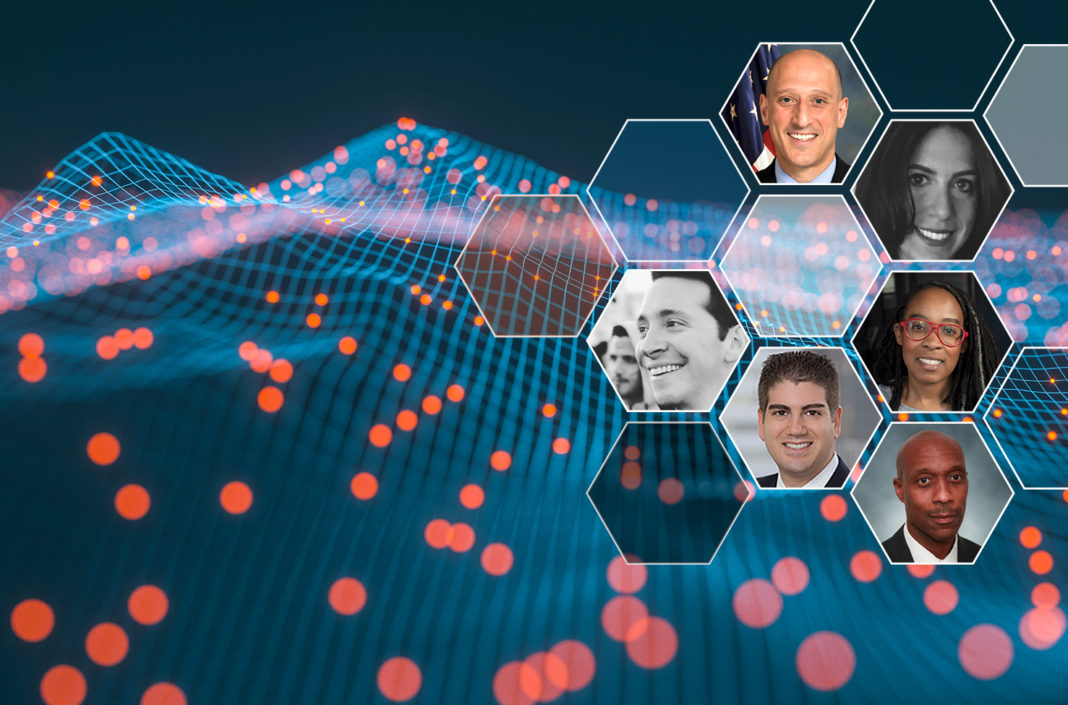Part I: A Leader in Privacy and IP • Part II: Alumni Stories
Meet six alumni whose work takes them to the front lines of emerging issues, from digital media to cybersecurity.
Nyasha Foy ’12
Associate Director, Business and Legal Affairs, VICE Media
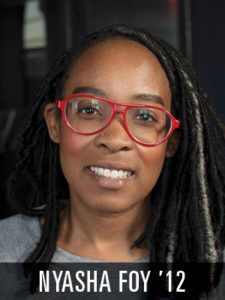 In the digital media world, life as a lawyer has a specific set of challenges.
In the digital media world, life as a lawyer has a specific set of challenges.
“My day is filled with many types of questions from many types of people,” says Nyasha Foy of VICE Media. “Every time someone approaches me, it’s a pop quiz. They’ll say, ‘I have a problem; can you fix it? And I’ll respond, ‘Pleasure to meet you! How can I help?’”
As Associate Director of Business and Legal Affairs, Foy provides counsel on a wide range of IP and entertainment law issues. On any given day, those issues could concern VICE’s critically acclaimed HBO news show (VICE News Tonight just won a Peabody for its Charlottesville episode), its numerous digital video series, its social media content, its music business, or its print magazines (including its namesake, VICE, and Garage Magazine).
Foy works closely with creatives, editors, producers, and decision-makers on issues ranging from content creation, licensing and distribution, rights assessments, and copyright. She also structures a wide variety of entertainment and commercial transactions.
“One of the key things about being an IP attorney at a digital media company is that I’m dealing with people who are very creative and who may not necessarily be open to hearing, ‘No, you can’t do that,’” she says. “I get to have important conversations with creators and decision-makers, where I can say, ‘I love your art and idea, but if we move forward with it, there is risk.’”
“Learning how to have those conversations is key,” she says. “Of course you have to minimize risk, but you also can’t have people see you as the ‘Department of No.’ If they do, they won’t come to you beforehand. They’ll only come to you afterwards with a problem.”
Her work at VICE has exposed Foy to broader trends in navigating IP issues that affect digital media: shorter content, new ways of sharing it, the monetization of digital content, and privacy.
“We are 30 or 40 years past when U.S. copyright law came into effect,” Foy says. “And we’re learning off the back of the music industry. Out of all of the content industries, music has been hardest hit in terms of moving forward as a business while respecting the law. But these struggles will make copyright more economically feasible for all parts of the system. I’m excited to do this work in real time.”
Another emerging issue she sees is native advertising—paid-for content that matches the tone and style of the publication that houses it. Foy says that ideas about native advertising are “nuanced and based on generation.”
“Younger people are so used to ads,” she says. “As social media and digital spaces have evolved, we’re having more conversations about how a brand should be affiliated with a product. The people who are developing the rules on Capitol Hill grew up in a very different digital environment than the people who are being asked to follow the rules. It will be interesting to see how the two roads meet in the next 10 or 15 years.”
Foy says that NYLS played a huge role in laying the groundwork for her career. She entered law school determined to pursue IP, entertainment law, and internet law. She credits courses like Advising Entrepreneurs and Negotiation Counseling and Interviewing with teaching her the transactional and communications skills she uses every day. Foy also served as a student research fellow for the predecessor to NYLS’s Innovation Center for Law and Technology.
Outside of VICE, Foy is an active mentor. She is Chair of the Black Alumni Council at Wesleyan University (where she earned her B.A. in Music and French); Chair of the New York State Bar Association IP Law Section Young Lawyers Committee; and active in the National Black Law Students Association and the Black Entertainment Sports Law Association. She’s also a member of the City Bar Choir.
In April 2018, Foy was an honoree at NYLS’s 23rd Annual Black Law Students Association Alumni Awards Dinner.
“I think it’s important to have visibility and representation,” she says. “I don’t have a lot of chapters in my book, but I surely have a lot of pages. I try to give my energy and time as best I can.”
Jared Kagan ’10
Associate, Debevoise & Plimpton LLP, Intellectual Property and Media Group
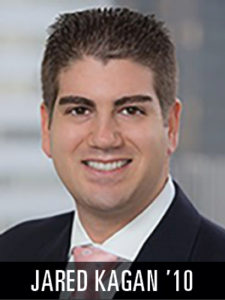 Jared Kagan’s practice brings him into contact with prominent brands, from the co-working giant WeWork to trendy sports drink BodyArmor and the clothing retailer New York & Co.
Jared Kagan’s practice brings him into contact with prominent brands, from the co-working giant WeWork to trendy sports drink BodyArmor and the clothing retailer New York & Co.
“I’m fortunate to work on really interesting cases involving products that are a part of people’s everyday lives,” he says.
Since graduating from NYLS in 2010, Kagan has been an associate with Debevoise’s Intellectual Property and Media Group. (Before that, he was a summer associate at the firm.) His practice includes litigation and counseling on trademark, false advertising, copyright, and defamation matters, and he has litigated in both state and federal court, as well as before the U.S. Patent and Trademark Office’s Trademark Trial and Appeal Board and the Better Business Bureau’s National Advertising Division.
Recently, he helped successfully defend Take-Two Interactive Software, the video game developer behind “Grand Theft Auto V” after the company was sued by actress Lindsay Lohan and reality star Karen Gravano (of the show Mob Wives). Lohan and Gravano claimed that digital avatars in the game resembled them too closely. When the New York State Court of Appeals struck down their claims in April 2018, affirming a prior decision, it marked “the first cases in New York to protect video games against right of publicity claims,” as Kagan and others from Debevoise noted in their article summarizing the case.
Last year, Kagan was part of the Debevoise team that reached a swift and favorable settlement for WeWork in its trademark dispute with UrWork, a Chinese co-working company looking to expand into the New York City market.
In July 2017, UrWork announced plans to partner with the U.S. co-working company Serendipity Labs on a joint venture at 28 Liberty Street in the Financial District. WeWork sued UrWork and Serendipity in September 2017, arguing that the Chinese company’s name was confusingly similar to its own and seeking to block the name from being used in the United States. In December 2017, on the eve of a preliminary injunction hearing, the parties settled, and in early 2018, UrWork changed its name to UCommune.
“We developed a strong case, and we were able to reach a global resolution,” Kagan says.
Kagan was also part of the team that reversed treble damages for clothing retailer New York & Co., thereby reducing by over $3.8 million a $5.6-million trademark infringement verdict against the company related to a line of athletic wear. And he has helped defend brands such as BodyArmor, Costco, and Unilever in trademark, false advertising, and copyright disputes.
Though he has focused his career on IP work, Kagan majored in Industrial and Labor Relations at Cornell as an undergraduate and entered NYLS with a plan to pursue business law. Ultimately, his approach proved helpful.
“At NYLS, I developed tools needed to address the issues I’m dealing with now,” he says. “Courses like Corporations and Taxation gave me a better understanding of our clients’ needs and priorities.”
Kagan is also drawn to pro bono work, which he’s been able to do at Debevoise. For two years, he represented terminally ill patients and their physicians in a lawsuit against the New York Attorney General’s Office. Its goal was to ensure that mentally competent, terminally ill patients facing unbearable suffering could, with the help of their doctors, choose to take medication to bring about a peaceful death. This treatment is known as medical aid-in-dying.
“Physicians in New York City who want to provide medical treatment to their patients are fearful,” he says. “We were concerned that the statute violates patients’ autonomy and freedom of choice.” The case reached the New York State Court of Appeals but was ultimately dismissed.
“Despite the outcome, it was an important case for clients, and hopefully the legislature will take the initiative to change the law in another way,” he says.
Aristedes Mahairas ’00
Special Agent in Charge of Special Operations/Cyber Division for New York, FBI
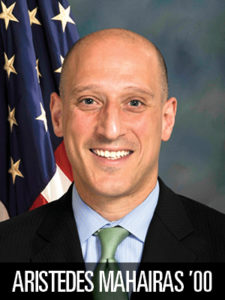 Cybersecurity issues have dominated headlines in recent months, from Facebook’s data breach to a ransomware attack on Boeing, another on Atlanta (which reportedly cost the city more than $2 million), and the Justice Department’s indictment of nine Iranians charged with executing a massive hacking crime.
Cybersecurity issues have dominated headlines in recent months, from Facebook’s data breach to a ransomware attack on Boeing, another on Atlanta (which reportedly cost the city more than $2 million), and the Justice Department’s indictment of nine Iranians charged with executing a massive hacking crime.
Special Agent Aristedes Mahairas, who leads cybersecurity operations for the FBI’s New York field office, cites these events as examples of the wide-ranging cyber threat landscape. It’s the latest role in his distinguished 22-year career with the FBI.
“These threats are diverse, they are complex—some in their design and some in their implementation—but they’re all dynamic, they’re all constantly changing,” he says.
And the culprits can be equally varied: nation-state actors from Russia, China, Iran, and North Korea; disgruntled employees; transnational organized criminal syndicates; or cyberterrorists.
Meanwhile, Mahairas notes, the cyber “attack surface” is growing. By 2020, there will be an estimated 50 billion Internet of Things devices, which can range from medical equipment to household items like refrigerators, home thermostats, and baby monitors.
“That’s 50 billion points of entry if not properly secured,” he says. “If you have the processing power of millions of devices now being overtaken by a central command and control server directing all to attack at one time, that creates a big impact.” In 2016, a series of coordinated attacks by Internet of Things devices temporarily downed numerous websites and social media platforms.
Anyone, Mahairas stresses, can be the victim of a cyberattack. He has written columns on the particular risks to big law (hackers may seek trade secrets, IP, and strategy information held by firms) and the judicial system (imagine the catastrophic deletion of sensitive testimony, evidence, or motions).
“The preparation is better than the cure, always,” Mahairas says. “So, what are we doing to minimize the attack surface, our vulnerabilities? And in the cases of a compromise, have we established an incident response protocol so that we can rely on muscle memory because we’ve trained through it appropriately?”
To be as prepared as possible, Mahairas focuses on building relationships with companies in the New York City region.
“We want to meet you and have a cup of coffee on a sunny day before the rain comes in,” is how he put it in a recent Yahoo Finance interview.
Similarly, he’s intensified public-sector recruiting efforts for the FBI’s Cyber Task Force. Like the long-running Joint Terrorism Task Force, the Cyber Task Force pools the resources of multiple local, regional, and federal law enforcement entities.
“The synergies it establishes from an investigative perspective and the force-multiplier effect it has on the investigative unit are critical,” he says.
In the last two-and-a-half years alone, Mahairas has been able to triple the number of partners in the Cyber Task Force.
One of the newer partners, the Westchester County Police Department, brought an especially valuable asset to the group: a canine named Harley. She’s one of about 20 dogs in the world capable of sniffing out the presence of a special cooling chemical present in USB drives, laptops, cell phones, and other devices cyber criminals may conceal.
Mahairas attended NYLS as an evening student while serving as an undercover FBI agent. (He earned his B.A. in Political Science from Baruch College.) He says that the IRAC approach to legal analysis—issue, rule, application, conclusion—sticks with him today. His job often calls on him to field competing strategies from his team of cyber-investigators and to ensure that the team buys into the final approach.
“I don’t think I’ve ever had a position where I’m not, in one way or another, taking that approach,” he says. “The training I received at NYLS has been a huge part of my everyday life.”
Peter Meischeid ’14
Global Content Licensing and Original Productions, Spotify
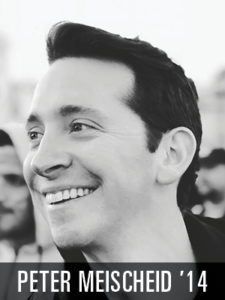 Peter Meischeid counts himself fortunate to have a front-row seat to the evolution of digital music. Since 2014, he’s worked for the music streaming company Spotify, which launched in Sweden in 2008 and expanded to the United States in 2011. The company now boasts more than 170 million users globally, and its model has changed how artists release new music and how listeners consume it.
Peter Meischeid counts himself fortunate to have a front-row seat to the evolution of digital music. Since 2014, he’s worked for the music streaming company Spotify, which launched in Sweden in 2008 and expanded to the United States in 2011. The company now boasts more than 170 million users globally, and its model has changed how artists release new music and how listeners consume it.
As a member of Spotify’s commercial team handling global licensing for original content productions, a major part of Meischeid’s role is to negotiate licensing and production agreements with global media companies, music labels, and others whose media will be shared with Spotify’s massive subscriber base. (The company offers both free and paid streaming options and curates content for its users based on their tastes and listening habits.)
Early on, he was part of Spotify’s creation of a global sales process, its ventures into new international markets, and its rapid growth.
“Being able to have a fairly large seat at the table, to voice my opinions, and to shape how things were being done from the ground up was exciting,” he says. “We were setting precedent for not only the company but also the industry.”
Most recently, he has focused on Spotify’s original programming, which include podcasts and videos. His work includes ensuring that music and assets are cleared for use in Spotify’s original productions, trademark permissions, licensing, and other agreements related to shooting video and recording podcasts.
“IP touches everything we do,” he says.
Meischeid was involved in one of Spotify’s most successful developments—enhanced multimedia playlists that mix music and video. He served as the main licensing point of contact for the day-to-day production of several popular playlists. The first, and one of the most influential, was RapCaviar, a curated weekly round-up of new hip-hop music that is widely regarded as the most successful genre-specific streaming playlist and has catapulted several previously unknown artists to global fandom.
“When we started the conversation a year or two ago, RapCaviar was a team of four people at a kitchen table in New York,” he says. “Now, the playlist has over eight million followers. It’s turned into a live concert series, with tours all over the country. I got to see it from the very beginning.”
Meischeid’s career calls for him to be innovative while respecting the practices of the music industry and working within a legal framework that was built before the internet existed.
“The biggest challenge is taking laws that were put into place a long time ago and finding ways to apply them to this new and uncharted territory,” he says. “We’re trying to innovate at internet speed without running into roadblocks and being handcuffed. A lot of my responsibilities are championing new ideas to external label and publishing partners.”
Meischeid says that striking a delicate balance is key—ensuring that both users and rights holders are satisfied and that all parties see their relationship with Spotify as mutually beneficial.
“I’ve definitely gotten better at it,” he says. “There was a bit of learning curve to understanding the viewpoints and measures of success for labels and publishers. It’s a great skill to have.”
Meischeid attended NYLS after earning his B.S. in Advertising from Temple University. He immediately focused on NYLS’s IP-related courses. He credits Elizabeth Dambriunas ’85 of NYLS’s Career Development Office as “instrumental” in bringing in industry contacts and connecting him to an internship at Viacom that confirmed his interest in the field.
“Once I went into the marketplace, knowing I had that backing was very important,” he says.
Lawrence Montle ’13
Chief Information Security and Privacy Officer, New York State Insurance Fund
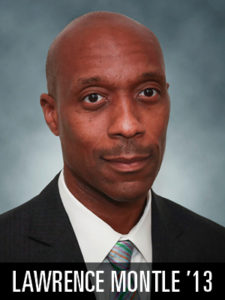 When Lawrence Montle leads data security trainings for his colleagues at the New York State Insurance Fund (NYSIF), he starts with an analogy of a dripping kitchen sink.
When Lawrence Montle leads data security trainings for his colleagues at the New York State Insurance Fund (NYSIF), he starts with an analogy of a dripping kitchen sink.
“If there’s a little leak in your kitchen sink, you can go to work, come back, and things will probably be OK,” Montle says. “But if you go on vacation for a couple of weeks and there’s a leak, not only your floor, but your whole house will be damaged.”
Montle, the Chief Information Security and Privacy Officer for NYSIF, has trained most of the Fund’s approximately 2,400 employees in how to safeguard sensitive workers’ compensation and disability benefits data. (NYSIF is a government insurer for employers in New York.)
Cyber-hygiene, Montle emphasizes, is critical both at work and at home. He’s got an analogy to illustrate that point too: “If you’re a terrible driver at home, you’re going to be a terrible driver with the corporate car, but if you’re a good driver at home, it will translate over.”
Montle is NYSIF’s first-ever Chief Privacy Officer, and creating a security awareness program is one of his key accomplishments since he took on the role in February 2016. After conducting trainings at the Fund’s offices across the state, he says he’s pleased to get calls from employees who notice new phishing schemes or potential security issues they wouldn’t have otherwise flagged.
“You can do many things with technology, but the adage is that your biggest worry is between the chair and the keyboard,” he says. “Educating people will not only make my life easier; hopefully it will last beyond me.”
He’s set up similar safeguards, including an extensive screening protocol, with NYSIF’s outside vendors.
When Montle became NYSIF’s Chief Privacy Officer, he was already Chief Information Officer. He says that the positions are complementary: The privacy part of his job is about knowing what data to protect; the cybersecurity part is about knowing how to protect it. Montle’s background in tech, combined with his J.D. and M.B.A. degrees, make him a natural fit for a job that is part legal, part business, and part tech. (Montle earned his M.B.A. from Fordham before attending NYLS as an evening student.)
“In the old days, lawyers would tell you, ‘You cannot do this,’” he says. “Now those lawyers don’t get hired in-house or as outside counsel. You need to be able to walk people through the rules without losing sight of where you want to go from a business perspective. It’s important to bring every possible tool to the problem.”
A challenge in many organizations, Montle says, is that information technology and privacy employees don’t speak the same language: Privacy counsel may not invest the time needed to learn the intricacies of tech, while tech employees defer to lawyers on the law. When teams are siloed and conversations need an “interpreter,” the process becomes inefficient, he says.
He stays “fluent” in tech by reading blogs like Ars Technica, The Register (a British site), and CSO (Chief Security Officer).
Ever-changing notions of privacy present another challenge. Montle recalls his college exam grades being listed on a bulletin board by Social Security number, in order to make them “anonymous.” What used to be considered a harmless practice is now illegal in New York. Conversely, some privacy practices that have generated intense criticism are not yet illegal.
“Right now, the public policy is struggling to catch up to the law,” he says. “What Facebook did with their data was legal by all laws at the time, but it had unintended consequences. There are laws on the books, but this is definitely an area where interpretation is king. So, if the box is a foot wide, you should probably be within that 6-inch middle so that you can comfortably say, we acted in an abundance of caution.”
Erica Stien ’05
Director, Global Privacy, American Express
 As a Director on American Express’s Global Privacy Team, Erica Stien helps ensure that the company’s consumer products—from credit cards to banking services—are built from the ground up with privacy in mind.
As a Director on American Express’s Global Privacy Team, Erica Stien helps ensure that the company’s consumer products—from credit cards to banking services—are built from the ground up with privacy in mind.
“We take a 360-degree, end-to-end view of privacy, from the ideation of a new card to the launch,” she says.
Stien has worked on American Express privacy policy for the past five years, and she has been a leader on the team for nearly two. On any given day, her role might encompass setting or updating privacy policies, negotiating agreements about data use with partner companies, or strategizing about customer experience for a product in development. She describes her job as a “hybrid legal function,” and she frequently interfaces with colleagues in both legal and business positions.
Stien and her team pay close attention to the legal and regulatory framework that governs data privacy in the United States. A major component is the Gramm-Leach-Bliley Act, which sets standards for how financial companies can share customer data and how they can explain their data-sharing practices to customers.
Despite government guidance, however, the laws and rules that govern privacy are fractured, decentralized, and vary by industry. In some cases, regulations have fallen behind the advance of technology. The European Union, by contrast, has the 2016 General Data Protection Regulation, a comprehensive effort to establish digital rights for individuals.
“I came from a mergers-and-acquisitions corporate background, where things had to fit within four corners,” Stien says. “There isn’t as much of a border for privacy. We can’t always point to a law and say whether something is right or wrong.”
Another challenge is the proliferation of new technologies, like Internet of Things products, which enable new forms of data collection.
“Many of us who work in privacy are lawyers, but we need to understand this digital world where scientists and engineers have been operating for years,” she says. To stay abreast of the technical side of her job, she networks with other privacy professionals and partners in the tech space.
Amid evolving legal and technical landscapes, Stien says that her team finds stability and focus by prioritizing customer experience and trust.
“Being very clear with customers, what we call the ‘feels right’ component, is where many companies are going,” Stien says. “Your customers have to feel good about the product.”
Her team speaks with consumer advocacy groups to identify customer concerns, as well as opportunities to be more transparent.
“I like what I do because I’m working towards honesty and transparency in a world where a lot of people are starting to better understand privacy,” she says. “Until a few years ago, it was the Wild West. Accomplishing things in a privacy-centered way is rewarding. And I get it; I’m a customer too.”
Stien is particularly proud that she was able to transition into privacy, an area she knew little about in law school. Stien began her legal career practicing corporate law at large firms, including Withers LLP. Before attending NYLS, she graduated from the George Washington University with a B.B.A. in Marketing and International Business.
“Privacy is a great field for lawyers who are looking to pivot,” she says. “It’s a hybrid legal profession, but it uses a lot of the analytical thinking you learn in law school. Looking back on it, I laugh because I took a cable law class when I was a student at NYLS. I was always interested in the fringe.”


